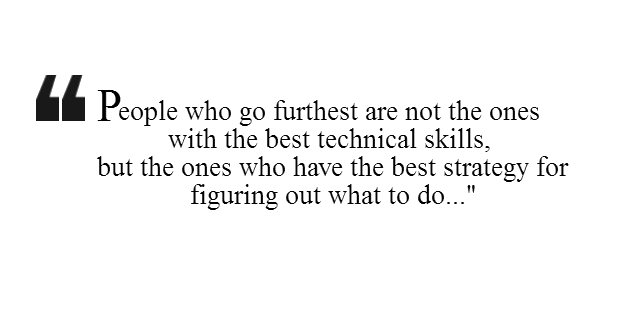Software engineers are among the most in-demand and lucrative careers in the global job market right now. So, if you're looking for an engineering job, all you need to do is prove you're skilled at programming, right? Not so fast.
Stephen Wolfram, the chief designer of the Mathematica software app and the Wolfram Alpha answer engine says it best: “One thing I’ve noticed is that in almost every area, the people who go furthest are not the ones with the best technical skills, but the ones who have the best strategy for figuring out what to do,” QZ.com reports.
Competitive companies are looking to bring on teammates who are not only phenomenal coders but also high-impact communicators and leaders who can take their business and product to the next level.

“Software development is a team sport,” says Flo Motlik, CTO and cofounder of Codeship. “Today's infrastructure is very complicated. It can be difficult to fully understand and implemented by separate people.”
Being well-versed with the most current in-demand software programming skills, like JavaScript, MySQL, C# and ASP.Net (to name a few) is a given. But candidates who truly standout carry a strong sense of intangible skills as well.
Here are five of the most pertinent skills that hiring managers look for in addition to stellar tech hard skills:
1. Listening: Conscious Understanding of Customers or Users
“Everyone in the development team should try and understand their customers in as much detail as possible,” says Stuart Easton, CEO of
TransparentChoice.
When you're developing a prototype, it's crucial to involve your potential customers. Listening is the only way to learn their needs and meet them.
“As a developer, you make design decisions every day," Easton says. "If you understand your customer, their pain, their goals, the things that are in their way, you will make better design decisions and a developer who makes good design decisions is very attractive to employers.”
2. Big Picture Thinking: Focus on the Business as the End Goal
“Good software developers care first about the business proposition and secondarily about the code they are writing,” says Todd Conner of
Flank 5 Academy.
During the interview, Conner likes to ask his candidates to describe the methodology they would use to develop a system presented in a case study.
“Software engineers are the architects and the builders of the system defined by the customer," Conner says. So, he elicits "the candidate's concept of their role in development of the system" and learns "whether the candidate's focus is on the hard skills or soft skills. Hard skills are easy to learn. Soft skills are difficult to learn.”
3. Communication: Clearly Convey Your Ideas to Others
Motlik says his team, much like many up-and-coming tech companies, are spread across multiple countries and time zones. Communication is essential.
“Being able to properly communicate within the team, bring forward concerns and convince people of your ideas are crucial,” Motlik says. “Without these skills, the team will not be able to function or implement anything meaningful.”
Browse great software engineer jobs
4. Add Value: Offer Strong Ideas and Stick By Them
Piggybacking on No. 3—in addition to strong communication skills, it’s equally important to be able to convey passion about your craft and your beliefs.
The best software engineers are folks who aren’t “afraid of standing up for their points of view. Because we are team-oriented, we want people who can offer their ideas and stick by them. We don't want people who just follow commands; we want people who can add value,” Motlik says.
That being said, it’s also important to be open to constructive criticism as well—it’s a two-way street! Elizabeth Nguyen, product manager at CyberCoders, says that the most successful candidates are open to constructive criticism.
“From the interview, we need to gauge whether they will be a good fit for the company,” says Nguyen. “Someone is a good fit if they have the interpersonal skills for that environment, is a team player and is open to constructive criticism.”













